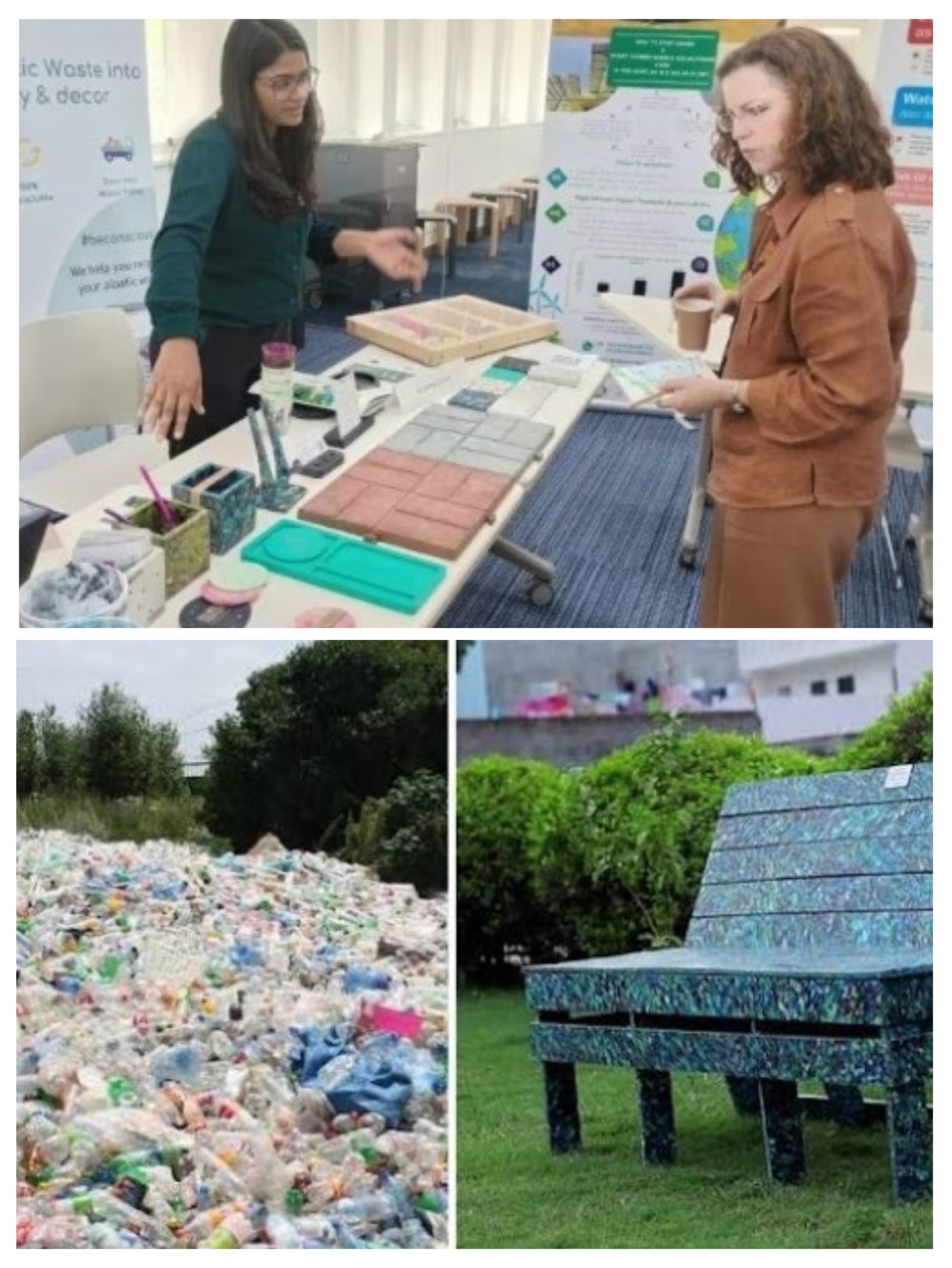Plastic Waste Into Park Benches? Here’s How 2 Entrepreneurs Are Making It Possible
By Leila Badyari Castelino, thebetterindia.com
Plastic pollution is a massive issue, contributing to global CO2 emissions and damaging ecosystems. This startup is tackling the problem head-on by turning waste into something useful.
Plastic pollution is one of the most urgent challenges to achieving a sustainable future — an all-too-familiar sight, from beaches to urban streets. Apart from endangering marine life, soil fertility, and human health, plastic waste also contributes approximately 3-4% of global CO2 emissions.
Econscious recycled plastic products
Entrepreneurs Sonal and Vaibhav are tackling the plastic waste challenge head-on.
Since plastic is part of almost everything we use daily, solving the crisis might require rethinking what happens to plastic after we use it.
Two young entrepreneurs, Sonal and Vaibhav, are tackling this challenge head-on. Moved by the heartbreaking plastic pollution they witnessed during a trek in the Himalayas, they founded ‘econscious,’ a Delhi-based startup that turns post-consumer plastic into chairs, dustbins, and flower pots. So far, econscious has recycled around 3,50,000 kg of plastic waste.
How do they do it?
At the heart of ‘econscious’ lies a unique “value-based recycling technology.” Instead of simply melting down plastic into pellets, a common practice in traditional recycling, they use plastic flakes.
“Traditional recycling often involves turning plastic into small pellets, which consumes a lot of energy. Instead, we skip the pellet-making process and use plastic flakes. This choice not only saves energy but also reduces our environmental impact,” shares Sonal.
This innovative approach minimises energy consumption and preserves the quality of the recycled material, ensuring that the final products are durable and aesthetically appealing.
Products made of recycled plastic
Vaibhav and Sonal are recycling plastic waste to make durable products.
The process begins with meticulous collection and sorting of plastic waste from various sources, including households, businesses, and local communities. The collected plastic is then thoroughly cleaned and processed into flakes.
These flakes are then compressed into eco-boards, durable and versatile materials that can be used to create a wide range of products, from park benches and dustbins to planters and eco-friendly gift items.
This novel approach has drawn interest from prominent brands, including Bisleri, Nestlé, and HCL Foundation, who have partnered with ‘econscious’ to utilise their sustainable solutions.
While challenges remain, including access to funding and navigating complex regulations, Sonal and VaibhavPlastic Waste Into Park Benches? Here’s How 2 Entrepreneurs Are Making It Possible
By Leila Badyari Castelino
editorial@thebetterindia.com
Plastic pollution is a massive issue, contributing to global CO2 emissions and damaging ecosystems. This startup is tackling the problem head-on by turning waste into something useful.
Plastic pollution is one of the most urgent challenges to achieving a sustainable future — an all-too-familiar sight, from beaches to urban streets. Apart from endangering marine life, soil fertility, and human health, plastic waste also contributes approximately 3-4% of global CO2 emissions.
Econscious recycled plastic products
Entrepreneurs Sonal and Vaibhav are tackling the plastic waste challenge head-on.
Since plastic is part of almost everything we use daily, solving the crisis might require rethinking what happens to plastic after we use it.
Two young entrepreneurs, Sonal and Vaibhav, are tackling this challenge head-on. Moved by the heartbreaking plastic pollution they witnessed during a trek in the Himalayas, they founded ‘econscious,’ a Delhi-based startup that turns post-consumer plastic into chairs, dustbins, and flower pots. So far, econscious has recycled around 3,50,000 kg of plastic waste.
How do they do it?
At the heart of ‘econscious’ lies a unique “value-based recycling technology.” Instead of simply melting down plastic into pellets, a common practice in traditional recycling, they use plastic flakes.
“Traditional recycling often involves turning plastic into small pellets, which consumes a lot of energy. Instead, we skip the pellet-making process and use plastic flakes. This choice not only saves energy but also reduces our environmental impact,” shares Sonal.
This innovative approach minimises energy consumption and preserves the quality of the recycled material, ensuring that the final products are durable and aesthetically appealing.
Products made of recycled plastic
Vaibhav and Sonal are recycling plastic waste to make durable products.
The process begins with meticulous collection and sorting of plastic waste from various sources, including households, businesses, and local communities. The collected plastic is then thoroughly cleaned and processed into flakes.
These flakes are then compressed into eco-boards, durable and versatile materials that can be used to create a wide range of products, from park benches and dustbins to planters and eco-friendly gift items.
This novel approach has drawn interest from prominent brands, including Bisleri, Nestlé, and HCL Foundation, who have partnered with ‘econscious’ to utilise their sustainable solutions.
While challenges remain, including access to funding and navigating complex regulations, Sonal and Vaibhav remain optimistic about the future. They envision a future where plastic waste is not a burden but a valuable resource, transformed into something beautiful and useful. remain optimistic about the future. They envision a future where plastic waste is not a burden but a valuable resource, transformed into something beautiful and useful.

